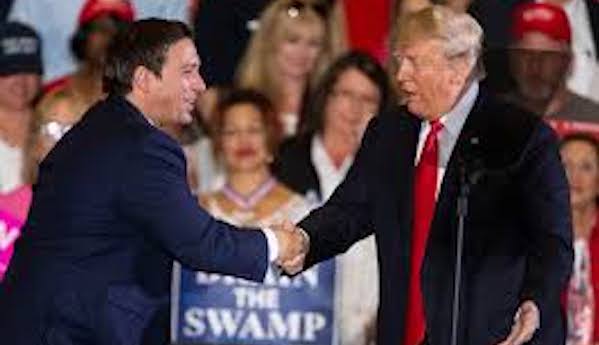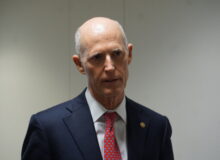Every election cycle, people claim it’s “way too early” to analyze the races. Occasionally that’s true, but the person is often intellectually lazy or doesn’t want to discuss why their preferred candidate is flailing.
A Republican presidential primary poll released last week revealed that perhaps the only person standing between Donald Trump and his third consecutive nomination is Ron DeSantis.
In a three-way ballot, it’s Trump 45%, DeSantis 40, and Nikki Haley 9. {Sorry, Vivek Ramaswamy, you’re an unserious millennial who worships the ex-president you’re trying to oust in the primary.}
Without DeSantis, it’s Trump 67, Haley 15, and Mike Pence 11.
Two out of three DeSantis voters prefer Trump to Haley or Pence, while one out of three DeSantis voters prefer Haley or Pence to Trump.
Put aside the astounding reality that many Republican voters want to nominate a 78-year-old who cost the party three consecutive national elections; pushed debunked conspiracies that led to a Capitol riot; obsessively slanders successful Republican leaders; and is under multiple criminal probes, is it still too early in the 2024 presidential primary?
DeSantis is not officially in, and it’s not quite April. We are over four months away from the first debate and 10 months from votes being cast in Iowa. At this point in the 2016 cycle, Trump still was 11 weeks from announcing his candidacy.
Many also point to 2008, 2012, and 2016 as cautionary tales about how the race did not look like early polling.
But there’s a caveat: the last three open GOP races began with candidates who were not as well known to Republican voters and thus genuinely were wide-open races.
The 2024 primary is fundamentally unlike any of those races — or any the last century — because it features a defeated former president as a front-runner.
Does anyone not have an opinion about Trump, the person who’s dominated American politics for eight years? If 67% of GOP primary voters tell pollsters now they prefer Trump to Pence or Haley, is there a reason to think that a large portion of that cadre would change their minds if they got to know the former vice president or former U.N. ambassador better?
“The leader in polls conducted in the first quarter of the year before the primaries has won the nomination more often than not in the modern primary era, dating to the 1970s,” election expert Nate Cohn wrote. “Even when front-runners lose, they usually succumb to another candidate with significant support in the early polls. Put it together, and there’s a decent relationship between the early polling and the outcome of the presidential primaries.”
We won’t know if DeSantis is legit, or another Scott Walker, until he steps onto a debate stage. DeSantis must assiduously tightrope a MAGA and non-MAGA coalition; as his aberrant comments about Russia’s war on Ukraine showed, that’s a delicate process.
And the happiest person? Joe Biden.
The president recently hit his lowest approval rate, and his affirmative action vice president is more disastrous than ever. Yet, Biden is looking at re-election because he believes he can beat Trump again. Will Republican voters nominate someone who can win next November or someone who whines about the past and has scant allegiance to conservatism?
Ari Kaufman is a correspondent for several U.S. newspapers and magazines from Minnesota and Ohio to Tennessee and Virginia. He taught school and served as a military historian before beginning his journalism career. He is the author of three books and a frequent guest on radio programs, and contributes to Israel National News and here at The Lid.






